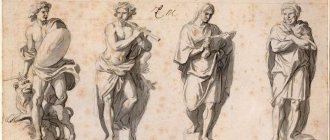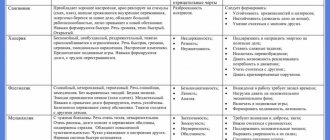Hello, dear readers of the KtoNaNovenkogo.ru blog. Who are they - phlegmatic, melancholic, choleric and sanguine? Have you often come across these words? In fact, these are 4 possible types of human temperament used in most currently available theories (Pavlova, Eysenck).
Curious to know who is who? How does a phlegmatic person differ from a choleric person and who, for example, is it better to be - a melancholic person or a sanguine person? And it’s even more interesting to understand who you are. After this, you begin to look at the world with different eyes.
Temperament, after all, determines the characteristics of a person’s behavior. It's a bit like a horoscope where you read about your zodiac sign and find similarities. But here it's the other way around. You need to read the description of all temperaments and understand which one you are closest to (pass the simplest logical test).
Today we will talk about the psychological characteristics of people with different temperaments, about their capabilities and purpose. We will also learn how to understand which type your personality is closest to (using a simple test) and give a visual psychological portrait of each of these temperaments, in which you will definitely find traits that are inherent to you personally.
Types of temperament according to Hans Eysenck (test)
Hans Eysenck's classification is currently the most famous. This scientist, in order to classify a person as one of the 4 main types of temperament (choleric, sanguine, phlegmatic or melancholic), used only two scales:
- Neuratism (emotionality) - it characterizes the degree of emotional instability of a given person, his inherent anxiety and tendency to depressive states.
To put it simply, this indicator indicates whether this person is self-possessed or, conversely, extremely nervous and prone to going to extremes. A person with a high level of neuroticism will be impressionable, anxious and unsure of himself. Moreover, all these features manifest themselves not only in stressful situations, but also in everyday life. High neuroticism does not mean that this person is neurotic, but the chances of him becoming one are very high under prolonged stress. - Extraversion and introversion .
A high score on extraversion implies that this person is focused on the outside world, on other people and on interacting with them (always with people). Extroverts are impulsive, optimistic, take risks easily, and are not afraid to interact with other people. Introversion, on the contrary, characterizes people who are withdrawn, immersed in their thoughts or emotions. However, introverts themselves are emotionally reserved, have a narrow circle of friends and prefer to keep their distance from the people around them. If you have already read my publication on the topic of introverts and extroverts, then you know that introverts never take risks, they think things through.
That is, according to Hans Eysenck, temperament is formed from only two variables - the degree of neuroticism and the degree of extraversion inherent in each individual person. As a result, this whole thing can be presented in the form of a graph, when neuroticism (excitability of the psyche) is plotted along the vertical axis, and extraversion (the degree of unsociability) is plotted along the horizontal axis:
Different people have different degrees of these parameters, but it is from their combination that the temperament of a particular individual (person) is formed.
quite difficult to find a sanguine person, choleric person, phlegmatic person or melancholic person in their pure form , but usually this is not required. It’s enough to simply understand what signs a person has more and which of these 4 types of temperament he is more likely to be classified as.
Just looking at the above graph we can say with confidence that:
A choleric person is a person who is characterized by high degrees of both neuroticism and extraversion (a sort of “city madman”, if you approach this with humor). It has the highest level of excitability and the lowest level of mental inhibition.
This makes him active, quick-tempered (sometimes even aggressive) with constantly changing moods. A choleric person speaks quickly and, as a rule, with active gestures and facial expressions. At the same time, he is unable to control his emotions.
A melancholic person is a person who is characterized by a high degree of neuroticism, but low extraversion (such people are not very sociable).
Melancholic people are extremely receptive and sensitive to the external environment. Because of this, unlike choleric people, they do not show their emotions (of which they have a lot due to high neuroticism), but keep them to themselves (they often have problems with what is called closing the gestalt). They are closed and conservative.
A sanguine person is a balanced person who is able to control his emotions (calm choleric). He can quickly change his plans and quickly adapt to external circumstances. If some activity is interesting to him, then he is able to be very active.
A sanguine person is a sociable and cheerful person, but to some extent frivolous and incapable of any long-term activity (work or relationships).
A phlegmatic person is a person who is distinguished by excellent calm. It is very difficult to piss him off and upset his internal emotional balance. This is associated with his low adaptation to changes and difficulty in switching activities. From the outside it seems that phlegmatic people are slow and very reserved.
Everything is the same, but in the format of a video medley on entertaining psychology:
Eysenck temperament test
This is exactly the classification given in the theory of Hans Eysenck and I like it because it is easier to apply in everyday life. In this case, the Eysenck temperament test will look extremely simple:
- For example, if you see that a person is simply uncommunicative, then you can immediately say that he is an introvert and then all that remains is to evaluate his emotionality. If this person is still emotional and does not react very rationally to stimuli, then he is most likely melancholic. And if, on the contrary, he is not emotional, then he is phlegmatic.
- And the same applies to extroverts (those who are “always with people”). If such a sociable person controls his emotions, then he is a sanguine person, and if emotions control such a person, then he is a choleric person.
There are other versions of the theory of temperaments. For example, in socionics they are considered as many as sixteen types, but this is a topic for a separate article.
Sanguine, melancholic, choleric, phlegmatic - what is your temperament?
Are you sanguine, melancholic, choleric, or phlegmatic? The article will tell you in detail about all types of temperaments.
Each person has a unique identity from the moment of birth. Any nurse working in a maternity hospital can confirm this: all newborns behave differently: one toddler sleeps twenty-two hours a day, the other, violating all the rules of behavior for “normal” babies, stays awake for a long time, interestedly and carefully examining those bending over him adults, the third does not allow them to forget about themselves for a second, emitting piercing screams...
These differences, thanks to which already in the first days of life one cannot confuse Masha with Dasha, and Petya with Seryozha, are nothing more than a manifestation of temperament. The attitude of parents, upbringing, life experience will further influence how these quietly sniffling (or loudly screaming) bundles will grow up, but temperament will remain more or less unchanged “factory setting”.
Temperament is a manifestation of the type of nervous system in human activity, individual psychological characteristics of a person, which express the mobility of his nervous processes, their strength, and balance.
We have already written a little about temperament in the article “Temperament is the biological basis of personality,” but here we will try to cover this topic in more detail.
The study of different types of temperament has a long history. The founder of this doctrine is the great ancient Greek physician and scientist Hippocrates. As this learned man believed, four types of fluid (juices) circulate in the human body: blood, yellow bile, black bile and mucus (phlegm).
Each of them has its own special properties, and in each person these four “juices” are combined in the body in a certain proportion. This combination determines the characteristics of the body’s activity, as well as its susceptibility to certain diseases. And besides, the characteristics of human behavior also depend on how exactly the four liquids are combined and which one predominates.
The names of the four types identified by Hippocrates appeared, however, several centuries later, as did their detailed psychological descriptions. What Hippocrates called by the Greek word “krasis” (“mixing”), in Ancient Rome began to be called by the Latin word temperamentum (“proper relationship of parts, proportionality”).
The Roman physician Galen first created a detailed classification of temperaments , which was based on the idea of the mixing of four liquids. However, in Galen’s classification there were as many as thirteen types (including four Hippocratic ones). As Galen believed, the predominance of yellow bile (lat. chole) in the body determines the choleric temperament, blood (sanguis) - sanguine, mucus (phlegma) - phlegmatic, and black bile (melanoschole) - meloncholic. Galen's actual psychological description of these four types was not detailed, but over time it expanded and became more and more detailed.
You are probably very familiar with these terms themselves - choleric, sanguine, phlegmatic and melancholic - and at least their approximate meaning.
Don’t miss the fundamental article dedicated to a different approach to the study of personality typology - “Who are extroverts and introverts?” Highly recommended reading.
The information presented below will probably seem interesting to you even if you can easily distinguish a sanguine person from a choleric person. It is important not only to know exactly what these types “look” like.
In practical life, it will not be superfluous to understand what the strengths and weaknesses of different types of temperament are, what is psychologically comfortable for them, and what, on the contrary, can cause stress. This information is useful both for self-analysis and for greater confidence in relationships with people around you. Let us also add this: in the past, many attempts were made in psychology to connect the psychological characteristics of temperaments with certain types of physical structure (human constitution). Strictly speaking, it was not possible to construct reliable evidence of such a connection. And yet we will give corresponding descriptions of the “typical” appearance of choleric people, sanguine people, phlegmatic people and melancholic people.
For the sake of curiosity, you can try these descriptions on yourself and your friends - perhaps some truth will still be found in them?
Choleric temperament
If we say about a person that he has an “explosive temperament,” then we undoubtedly mean choleric . This is a tornado man, a walking grenade with the pin pulled. He can’t even sleep at peace - and anyone who happens to be next to him will also have to forget about peace and stability.
The energy reserves that a choleric person possesses are amazing. It seems that he manages to be in several places at once and do a variety of things at the same time. A choleric person at work is a whirlwind and fireworks. It seems that in his hectic social activities he should have spent at least part of his charge, but no: returning from work in the evening, he does not enter, but bursts into the house and, during dinner, which he devours, without sitting down for a second, manages to report family about everything that happened to him during the day, dump on them a whole mountain of plans for the coming weekend, vacation and next Christmas, ask a hundred questions and answer them - and, we emphasize, all this happens not in order, but simultaneously! How he succeeds is known only to the lucky owner of an “explosive temperament.”
With all this, the choleric person is extremely purposeful. He instantly (how could it be otherwise?) makes decisions and rushes to their implementation at full speed. Because of the mind-blowing speed with which he thinks, speaks and acts, because of his desire to be in time everywhere and everywhere, one may get the impression that he is a disorganized, frivolous and inattentive person. But this is not true at all. The choleric person forms his goals not only very quickly, but also extremely clearly. He may, of course, not have enough time to devote others to his plans, but he himself knows very well what exactly he is striving for.
Communication with choleric people is often made difficult by the fact that they do not accept any compromises and are generally prone to a contrasting perception of the world - only black and only white, no shades or halftones! For the sake of a loved one, a choleric person, without hesitation, will go into fire and water, but he also demands the same from the object of his feelings. He is led through life not by reason, but by passion, and passion, as we know, is blind. Calm, reasonable arguments and unhurried development of relationships are unacceptable to him.
Portrait of a choleric person
Excitable, impulsive; energetic, decisive, purposeful, persistent; straightforward, demanding, prone to maximalism, uncompromising; pragmatic, selectively sociable.
How to communicate with a choleric person:
1. if he yells at you, remember: he’s not really yelling at all, he’s just talking like that;
2. if during the conversation the choleric interlocutor slammed his fist on the table several times, threw a lighter on the floor, stamped his foot - this does not mean that further dialogue with him is impossible; A person needs to relieve tension somehow!
3. if you need something from him, tell him about it immediately, openly and clearly: lengthy “preparing the ground”, hints and verbose introductions that precede a conversation on the merits, deprive him of the last remnants of patience and make him furious before you do you will finally have time to speak out;
4. deceiving a choleric person (even over trifles) is life-threatening! He himself is practically incapable of lying and does not forgive his loved ones for deception and insincerity;
5. remember, believe and humble yourself: he cannot sit in one place for a long time, talk about one thing for a long time, “show patience” and “control himself.” He will always react with irritation to delays, slowness, monotony and will never stop waving his arms and running around the room during an important conversation...
6. But if you do not betray his trust, you show sincere attention and interest in him, and even better - approval and even admiration, he will apply all his fantastic energy and extraordinary creative abilities to achieve your common goals.
Advantages and disadvantages
Choleric people usually achieve the greatest success in all areas related to communication: the “human factor” is of particular importance for choleric people due to their increased emotionality. A choleric person does not get tired of countless conversations; on the contrary, the emotions and attitudes of those around him charge him with energy. Of course, the violent temper of a choleric person often causes conflicts, but a choleric person who is passionate about some business or idea is always ready to neglect his personal interests in favor of the common good - it is only unacceptable for him to remain in the shadows and inactivity.
The unpredictability and impulsiveness of a choleric person can be, depending on the situation, both a strength and a weakness: he may not do what was expected of him, but it is choleric people who speak out! generators of ideas, because they are not afraid of novelty and are able to see a problem from a completely new perspective before others.
A choleric person easily and quickly adapts to new conditions and switches from one task to another. But with the formation of stable skills and the ability to perform routine work, to act according to approved instructions, things are much worse for him. Having given out brilliant new ideas, the choleric person quickly loses interest in them and is not inclined to carefully work through them, bringing them to perfection.
"Typical" appearance
Thin, often even fragile, long arms and legs, narrow chest, protruding joints; the skull is slightly cone-shaped, tapering upward, a pointed chin, a slightly developed or sloping lower jaw, a “protruding” nose - rather long, pointed.
Personalities A. S. Pushkin, A. V. Suvorov
Sanguine temperament
Sanguine people are everyone's favorites: sociable, cheerful and immensely charming. They often say about such people: “A surprisingly easy person!” But the lightness of sanguine people is not only their advantage, but also a certain disadvantage. You feel quite happy, basking in the rays of his smile... until you discover that exactly the same, warm and sincere smile can be addressed to your cat, and to all your friends and acquaintances, and to the cashier at the department store , and to the electrician who came to repair the wiring - in a word, to any living creature that comes into the field of view of this glorious lover of life.
It is almost impossible to ruin a relationship with a sanguine person. In response to all your reproaches, he will smile and laugh it off, advise you “not to take such nonsense into your head” and will nullify any attempts to talk seriously. And the point, of course, is not that he is stupid or indifferent. He just always strives for balance and puts emotional comfort above all else. If necessary, he is capable of demonstrating remarkable diplomatic abilities, but his goal is always the same: for everything to be fine.
In theory, this position is very attractive and quite worthy, there is only one problem: if a sanguine person is convinced that very serious efforts are required to maintain harmony, he will most likely go to look for this “good” somewhere else. Unlike a choleric person, a sanguine person switches quite easily from one goal to another and is not inclined to make sacrifices.
Portrait of a sanguine person
Sincere, open, sociable, talkative; optimistic, cheerful, emotional; ready to compromise, easily switches from one problem to another; flexible, able to adapt, enterprising.
How to communicate with a sanguine person
1. do not expect to gain exclusive ownership of his charming smile and attentive, interested attitude;
2. a sanguine person feels especially good if everyone without exception likes him; be prepared for his almost unconscious desire to charm everyone;
3. in general, maintaining good relations with a sanguine person is quite simple, since he always votes for world peace and is ready to make concessions in order to maintain harmony, but you should not abuse this: he will not withstand boredom, routine and indifference;
4. do not demand depth or strong emotional involvement from a sanguine person - he prefers comfort. He not only loves, but also knows how to create it, and with proper appreciation by others, this talent will manifest itself to the fullest.
Advantages and disadvantages
Sanguine people are distinguished by good switchability from one task to another and high efficiency. A sanguine person who is passionate about work does not pay attention to external interference and irritants, quickly develops and retains the necessary new skills and abilities for a long time - but where energetic volitional efforts or careful monotonous work are required, sanguine people often lose to choleric and phlegmatic people.
As for choleric people, the most significant for sanguine people is the “human factor”. Consequently, the optimal areas of activity for them are everything related to communication. A sanguine person can win over, convince, and charm. But the role of a strong leader, as a rule, is worse for him.
"Typical" appearance
Short stature, rounded shape, tendency to be overweight, short limbs, wide and convex chest; round head, “potato”, “duck” or snub nose, short thick neck.
Personalities M. Yu. Lermontov, Napoleon Bonaparte
Phlegmatic temperament
At first glance, a phlegmatic person is the complete opposite of a choleric person. Upon careful examination, many similar traits are revealed in the owners of these temperaments. This is, first of all, their persistence and desire to always achieve their goals. The only difference is the speed at which they do it. If a choleric person always overcomes obstacles on his way “at once,” quickly and recklessly, then a phlegmatic person acts very slowly and carefully, having carefully weighed all the pros and cons before doing so. Plans never “emerge” in his head, he painstakingly builds them, then nurtures them for a long time, and only then, after praying and rolling up his sleeves, he begins to implement them.
A phlegmatic person is not a warrior, but a creator. He is very peaceful, or at least too passive to enter into conflict. But this does not mean that he will obey all the demands of those around him: in terms of stubbornness, phlegmatic people are perhaps superior to representatives of any other temperament. If you express your dissatisfaction with his actions and try to change his plans, he will not argue or bicker with you - he will simply silently and persistently continue to follow his chosen path.
It is very difficult to make a phlegmatic person angry, and we do not advise you to even try to do this: if your attempt is crowned with success, then this “success” will be not only the first, but also the last - an angry phlegmatic person will not leave a wet spot on you. A slow and complacent, awkward and slightly funny phlegmatic person in a state of rage is transformed beyond recognition; he will simply crush the one who dares to disturb his peace. Fortunately, it is almost impossible to bring a phlegmatic person to such a state.
Portrait of a phlegmatic man
Closed, reserved, silent; peaceful, reliable, constant; slow, conformist; purposeful, patient, persistent, stubborn, pragmatic.
How to communicate with a phlegmatic person
1. do not demand quick decisions and actions from him - speed of reactions is completely inaccessible to him. This is a biological property, and not laziness, absent-mindedness or anything else of the same kind. All meetings and events in which a phlegmatic person takes part should be planned taking into account this feature;
2. Likewise, be sure to notify him of all your plans in advance: he needs time not only to get ready to visit, but also to generally get used to the idea of the upcoming visit. Phlegmatic people do not tolerate any surprise;
3. never try to “re-educate” him. This should not be done with anyone at all and never, but with phlegmatic people such behavior is especially unacceptable. If a sanguine person has a very developed ability to adapt to the demands of others, and a choleric person can, at least, be interested and captivated by something extraordinary, then a phlegmatic person recognizes only his choice and his path. At best, you will waste your time and energy trying to convince him, and at worst (if your complaints about him reach some critical mass) you will provoke an explosion of indescribable force
Advantages and disadvantages
The phlegmatic is the most efficient of all temperament types, and his labor productivity turns out to be the highest. This remarkable performance can be damaged by frequent changes in working conditions and contradictory requirements. The need to quickly make decisions puts a phlegmatic person in a very uncomfortable position, but this does not mean that he can only be good as a performer. Where it is necessary to maintain stable processes (and not search for new opportunities), a reliable and confident phlegmatic person can cope well with leadership work.
"Typical" appearance
A dense, well-built figure, massive build, well-developed muscles, arms and legs of short or medium length, often a tendency to be overweight, a short and wide chest; wide angular skull, large nose, short neck.
Personalities M. I. Kutuzov, I. A. Krylov
Melancholic temperament
Melancholic people are extremely vulnerable creatures. It is perhaps more difficult to get along with melancholic people than with anyone else. Although, at first glance, their character lacks many of the “problematic” traits of other temperaments: they, unlike choleric people, are not at all “explosive”; they do not have the boundless stubbornness and slowness of phlegmatic people, nor the desire to lavish their smiles and constantly change hobbies , so characteristic of sanguine people. Soft, submissive, touching melancholics are truly “white and fluffy”...
And yet, it is precisely establishing a relationship with a melancholic person that can become a serious test for you. The fact is that a melancholic person almost always feels deeply unhappy. He has very low self-esteem, he is extremely unsure of himself, full of all kinds of fears and anxieties. He probably has poor health, and even if there are no real illnesses, he will definitely discover a whole bunch of imaginary diseases. A melancholic person is ready to be offended or upset because of any trifle (perhaps even existing only in his imagination). It always seems to him that he is not loved, not appreciated, not given enough attention. And is it any wonder if all the people around are so good, interesting, attractive, and only he, poor, unfortunate, has not distinguished himself in anything, does not shine in anything, is not capable of anything - and so on ad infinitum.
It must be said that such a disdainful attitude of a melancholic person towards himself is completely unjustified. Yes, he really doesn't have much energy; According to the parameter “strength of nervous processes”, three types of temperament are classified as “strong”, and only melancholic is characterized as “weak”. But melancholic people also have a lot of advantages. Due to the fact that they constantly listen to their own feelings and sensations, they willy-nilly learn to feel other people as well.
A melancholic person knows how to understand, sympathize and console like no one else. In the complex world of human feelings, experiences and emotions, he navigates with his eyes closed. He is afraid to act, but thinks a lot. Sensitivity and well-developed intuition are very characteristic of melancholic people. And finally, they often have almost impeccable taste and are sincere connoisseurs of beauty.
Portrait of a melancholic man
Timid, shy, unsure of himself; does not know how to adapt, gets tired quickly; romantic, sensitive; anxious, vulnerable.
How to communicate with a melancholic person
1. always take into account his emotional weakness and instability: these are not whims or a manifestation of bad character, but the peculiarities of the functioning of the nervous system, and nothing can be done about it;
2. Praise, encourage and support him as often as possible - a melancholic person needs this more than anyone else. At the same time, under no circumstances invent merits or achievements that in fact do not exist: a sensitive melancholic person will instantly recognize insincerity. Just pay close attention to what he says and does, and you will definitely notice something that really deserves praise;
3. Be prepared for the fact that you will never be able to completely change the self-esteem of a melancholic person, making it consistently high, no matter how much effort you make. But if you constantly show him your attention and sincere interest, his self-confidence will gradually increase;
4. do not reproach him for constant complaints, but also do not react to them too sharply; a melancholic person will always find something to complain about and worry about, but you cannot plunge into the abyss of his despair with him. This will not help him and will significantly harm your own emotional health.
Advantages and disadvantages
Melancholic people are often distinguished by high mental abilities, but they manifest themselves very unstable. This is due to significant emotional mobility: a melancholic person quickly grasps new things, but weakness and instability lead to the fact that what has been learned can be lost just as quickly.
Emotional overload is contraindicated for melancholic people; the sphere of interpersonal relationships is not their element, despite their well-developed intuition: there is too much stress. But intellectual work that does not require constant communication is what is needed: a melancholic person can perfectly analyze, design, plan, and easily cope with large amounts of information.
"Typical" appearance
Fragility of appearance, thinness, long thin arms and legs, narrow flat or concave chest, thin waist and relatively wide shoulders and hips; the skull tapers downwards, the forehead is high, the chin is sharp, the lower jaw is weak, the jaw is long and often pointed.
Personalities P. I. Tchaikovsky, N. V. Gogol
After reviewing the portraits of the four types of temperament, you may have doubts: some traits seem to be very reminiscent of yourself or your friends, but none of the people you know exactly fit the descriptions presented.
There is nothing surprising here. There are no “pure” choleric people, sanguine people, phlegmatic people and melancholic people in the world; we can only talk about the predominance of one of the types. Traits characteristic of a type can be expressed to a greater or lesser extent. It was not for nothing that we began the story with ancient history: remember, the word “temperament” itself means “mixing of parts.”
So, in each of us, traits of all types are mixed, but the proportion in which this cocktail is composed determines the characteristics of reactions and behavior.
At the moment, psychological science has gone much further in studying the personal characteristics of each person. After all, it is impossible to simply take and divide all the people on the planet into four groups, so modern researchers have gone much further - in our time, there are many so-called psychological types of a person or psychotypes of personality, when determining which a huge number of factors are taken into account, and not just temperament or character.
Read more in the article “Human Psychotypes. General characteristics".
An even more modern trend is an individual approach to determining personality type. Read more in the article “What is your personality type?”
We also cannot help but draw your attention to the unique psychological testing presented in the analytical module “Personality” on our portal, which combines a multifaceted analysis of your individual characteristics, character, temperament, and abilities. Read more here.
Share with friends and rate the publication
Tweet
| Advertising: |
Don't miss other related articles:
- Managing the uncontrollable, or what is emotional intelligence (EQ)?
- What is a psychological problem?
- What is Stockholm syndrome?
- Alcoholic delirium of jealousy. What is this?
- Motivation is internal and external. All types of motivation.
Only registered users can leave a comment. You can register or login
Sanguine - who is he and what are his characteristics?
This type of temperament is, in fact, an average representative of humanity and, as it were, an unofficial norm (in any case, Academician Pavlov believed so, considering all other types of temperament to be deviations from this norm).
- A sanguine person has a strong and very mobile nervous system. This results in his high performance and the ability to easily switch from one task to another. This is where his ability to quickly adapt to any situation grows.
- A sanguine person has a high sensitivity threshold, so external stimuli do not make him angry like a choleric person, but at the same time he is not particularly sensitive to the opinions of other people.
- At the same time, he has a mobile and fast nervous system, which directly affects his behavior. In life, such people are very active, fast, they have active facial expressions and bright gestures.
- A sanguine person is a prominent representative of extroverts (see Hans Eysenck’s classification above). That is, all his attention is directed “outside,” which means external objects are more important to him than internal ones (his thoughts, experiences).
- In himself, he is lively and expressive, always trying to realize his impulses (desires, ideas). If he wants to do something, then he does it, and is not tormented by doubts, like a melancholic person, but at the same time controls his impulses, unlike a choleric person. All this determines another important property - its activity in the external environment (society).
- This set of qualities makes a sanguine person the most adapted and feels very comfortable in society. Due to their “gregariousness,” they fit well into society and strive not to be too different from others.
- At the same time, a sanguine person has a strong “ego”, i.e. he has excellent control over himself, his emotions and feelings. The ability to restrain oneself presupposes the predominance of rational (deliberate) thinking over irrational (impulsive). Those. Sanguine people are completely logical and rational people.
- This type of temperament is best suited to working with people in a variety of ways. That is, the best salesperson, for example, will come out of a sanguine person, since he most easily adapts to other people and knows how to easily communicate with them.
- But, for example, this type of personality is not well suited to work as a psychologist, since such work requires a person to be highly sensitive to other people’s opinions, and not to push his own interests.
- Sanguine people have a very average ability to learn and for the most part do not have deep knowledge (that is, they are rather superficial). Acquired skills do not last very long, and when switching occupations, people with this type of temperament quickly lose them.
- Such a person is not particularly capable of deep relationships with people. This also applies to love, because the feelings of a sanguine person fade quite quickly. In friendship, everything is also very similar - the relationship continues until the moment there is a divergence of interests.
- Sanguine people have good, but not the best, leadership qualities. In addition, they easily get along with people of any other type of temperament. This happens again due to their high ability to adapt, since it is easy for them to adapt to any person.
- In conflicts, a sanguine person tends to get out of it and smooth out the situation with words rather than with fists, although the latter is quite possible.
The influence of temperament on human life
Each person has his own personality. The path of life for everyone is determined by the life circumstances passed through, their perceptions and beliefs of the person. In any case, it is the years lived that correct the worldview and shape the behavior of a person with his character.
Sanguine people make excellent leaders. They have good prudence and know perfectly well how to win people over. This type of personality is suitable for work in the fields of pedagogy, journalism, medicine, and the like... These individuals avoid monotony in work, which is why the field of activity as an archivist, restorer, or accountant is unlikely to suit them.
Cholerics, in turn, are distinguished by their leadership qualities, which makes them good and fair bosses. This type of people quickly adapts to changes and can easily change their environment. Cholerics are characterized by a work environment with reduced energy consumption: designers, journalists, politicians, miners, speakers, TV reporter, radio presenter, artist, manager, entrepreneur. It is practically impossible to force this type of personality to work monotonously with papers.
Phlegmatic people, during a stressful situation, in any area of life, can always cope with it perfectly and take the ideal action. Phlegmatic people have a strong side associated with the exact sciences. A phlegmatic person can become a brilliant mathematician, IT specialist, astronomer, microbiologist, biophysicist, cultural scientist or botanist.
Melancholic people are good workers, they can cope with any life task. They are very successful in activities that require attention to detail and observation. Melancholic people prefer to work alone from other people. A melancholic person can be an excellent film critic, writer, radio mechanic, fashion designer, turner, agronomist, mechanic, or veterinarian. Their work should not contain stress, since their nervous system is very shaky, a profession such as a doctor, rescue service, or military will be unbearable.
Attention! Paying attention to the characteristics of each of the temperaments, in no case should one single out that some of them are good and some are bad. Each personality type has its own advantages and disadvantages.
Choleric - who is it?
- A choleric person has a very strong, but extremely unbalanced nervous system (i.e., excitement predominates in his brain activity). This suggests that a person with this type of temperament is extremely emotional and has a strong reaction to external stimuli (sometimes he can be confused with a sociopath).
- However, the sensitivity of a choleric person is extremely low, so he does not assess external reality very well (does not cut the chip). At the same time, his speed of nervous processes is even higher than that of the sanguine person described above, so he is extremely fast and extremely sharp.
- A choleric person is again an extrovert, that is, external stimuli (communication, interaction) are much more important to him than his internal state (that is, he never engages in self-examination).
- This type of people always strives to realize their impulses, including in their expression, which, by the way, is much more pronounced than that of a sanguine person. That is, a sanguine person has smoother and less sweeping gestures, but a choleric person always waves his arms and looks in all directions. His voice is also more emotionally rich, as well as his facial expressions.
- The choleric person is very reactive (has a quick response to external stimuli), and therefore his attention is quite easy to attract, and his reaction to ordinary stimuli is sometimes also very exaggerated. For example, he may take a common remark with hostility or lose his temper over any trifle.
- A choleric person is also, in principle, socially adaptive, although to a lesser extent than a sanguine person, because the choleric person’s reactions to others sometimes seem not entirely adequate.
- Choleric people have a weak “ego”, that is, they have great difficulty restraining their emotions and impulses. Such people are very emotional and they often make decisions on an emotional basis (i.e., irrational thinking predominates in them).
- For such people, working in the media or show business, for example, is good because... they are good actors and can easily get into character. They are also characterized by such professions as musicians or artists.
- Cholerics for the most part are not trainable. They mainly grasp only superficial specific knowledge, but not the general theory, so it is difficult to talk about professionalism and depth of knowledge here. Although such people can learn specific practical skills well and be specialists in this regard.
- Cholerics have unique relationships with people. Usually, those around you get tired of these causeless and inadequate emotional reactions. For choleric people, relationships are always emotionally oversaturated. But in general, a choleric person can be perceived as a very good friend. He can become quite attached to a person, to the point of wild jealousy and deep resentment.
- Love relationships among choleric people are also passionate, but short. And basically such relationships are accompanied by a certain drive and extreme. The most optimal pair is a choleric person and a sanguine person. But phlegmatic and melancholic people cannot stand people with this type of temperament.
- Cholerics are often credited with outstanding leadership qualities, but everything is not so simple here. Yes, Zhirinovsky can be called a leader, but not in life, but in public. That is, it is not a fact that if in life you communicate with a choleric person, he will necessarily be a leader among you.
- For example, in most sanguine-choleric couples, the leader most often becomes the sanguine person, because he, as a rule, is smarter and more cunning. But the choleric person is quite emotional and simply follows the lead of the sanguine person.
- It is also worth saying that emotional (irrational) decisions are not particularly acceptable in modern society. Therefore, people, as a rule, adequately evaluate their leader and understand that he is carrying some kind of blizzard and that he is overwhelmed by emotions, not thoughts.
- A choleric person usually reacts emotionally to conflicts, which is quite expected. He is unlikely to use communication to solve problems, but will simply immediately use his fists or start yelling (depending on the type). However, people of this type are also cowardly, so if you intimidate them, they will quickly back down.
Extroverts and introverts
The qualities of temperament include introversion and extraversion, the pace of reactions, rigidity (inflexibility) and plasticity.
Extraversion and introversion are qualities of temperament that were introduced as concepts by Swiss psychiatrist Carl Gustav Jung.
- An extrovert focuses on his own manifestation in the world around him, that is, on external impressions that arose in a given period of time. These include choleric and sanguine.
- An introvert - on his inner world, psychological state, that is, the internal reality is more important for him than the external one. These are phlegmatic and melancholic.
Phlegmatic - his personality characteristics
- A phlegmatic person has a very strong and inert nervous system (it is difficult to unbalance him). Such people are able to engage in monotonous activities for a long time without getting tired at all. Such a person gets stuck on something and it is quite difficult for him to switch.
- The nervous system of a phlegmatic person is quite slow, so from the outside he may look slightly inhibited both in actions and in perception. For example, such people gesture little, move slowly, and are not particularly dexterous or fast. They seem to be slow to get anything. It is especially difficult for phlegmatic people to react quickly when something is conveyed on an emotional level.
- A phlegmatic person is a pronounced introvert (for him, internal representation is more important than external stimuli). Although, unlike a melancholic person, for whom his emotional processes are more important, for a phlegmatic person his thoughts are more important.
- Due to the predominance of inhibition processes in mental activity, it is very easy for such people to stop their internal impulses and restrain their emotions (they have a strong “ego”). But they tend to accumulate affect. That is, the phlegmatic person will restrain himself the first time, the second time too, but the third time he can throw out all his accumulated aggression at once and no one will find it enough.
- Phlegmatic people are quite socially adapted. Problems can arise only in understanding the feelings (and subtexts) of other people, and your own feelings too. However, in real life it doesn't look so scary.
- Also, phlegmatic people quite easily and naturally support social attitudes, although they reach them more slowly (they may follow a slightly outdated fashion).
- Due to the predominance of inhibition in the emotional sphere, such people are very rational and make decisions only on the basis of logic (without any impulsiveness).
- Individual and monotonous work is well suited for phlegmatic people. They make excellent programmers, financiers, scientists, engineers, and the like. In general, people with this temperament are excellent hard workers.
- There are many phlegmatic people in science, although if we talk about true genius, then this is more likely to be melancholic. Such people have low learning ability, that is, they take a long time to grasp certain skills, but if they have already learned something, they will never forget it.
- The phlegmatic also gets along with people rather slowly, and at the same time, the relationship still remains rather superficial due to the lack of emotional overtones.
- But nevertheless, such people are still capable of long-term relationships due to the fact that it is simply difficult for them to switch to another person (they get stuck). Although, after breaking up with you, a phlegmatic person will not be so upset due to the extremely low emotional component and tendency towards introversion (loneliness).
- Phlegmatic people get along well with melancholic and sanguine people, but they will have trouble with choleric people.
- A phlegmatic person completely lacks leadership qualities. He is not interested in people and is unable to engage them emotionally. In any couples, whether with a melancholic or a sanguine person, he will be more likely to be a follower.
- Phlegmatic people do not react to conflict in any way. That is, they do not show any emotion when aggression is directed towards them. And in order to bring this type of people to assault, you have to try very hard. But in this case, the release of anger can be colossal.
Reaction speed, rigidity, plasticity
The speed of reactions is a characteristic of the pace at which mental processes and the body’s response occur. These include quickness of mind, speech and gestures. The speed of reactions is high in people who are sanguine and choleric, as well as in melancholic people - if they are well rested. In melancholic people who are tired and phlegmatic people it is lowered.
Sometimes this causes problems in communication between people with different temperaments. People with quick reactions do not always notice that people who are more inhibited do not have the opportunity to follow the course of their thoughts. Because of this, they come to unfounded conclusions that the latter have low mental abilities. This can especially interfere with business relationships.
Rigidity and plasticity . The first quality indicates that a person has difficulty adapting to external influences, while the second, on the contrary, indicates good adaptation. Sanguine people have the highest plasticity. Rigidity is characteristic of melancholic, phlegmatic and choleric people.
Melancholic - who is he?
It remains to consider only one type of temperament.
- A melancholic person has a rather weak nervous system (prone to emotional outbursts). This means that he is incapable of long periods of stress and has high distractibility. In this regard, they, by the way, do not respond very well to hypnosis - they are too distracted and are unable to concentrate.
- At the same time, the nervous system of the melancholic person is stuck. Therefore, know that if you offend such a person with something, he will remember it for the rest of his life.
- It would seem that such a nervous system should allow one to concentrate on some goal (get stuck), but the problem is that with any failure, the melancholic person gives up and does not make any more attempts.
- People prone to melancholy are the most sensitive of all personality types to the external environment, so they see subtleties that no other person (with a different temperament) would ever notice. Including subtleties in the behavior of other people.
- A melancholic person distinguishes shades of emotions and people’s behavior much better than others, although at the same time he himself sometimes seems unemotional and is often confused with a phlegmatic person.
- The speed of the nervous system of a melancholic person is quite high, which, however, is not particularly manifested on the outside (all emotions seethe inside a person).
- Outwardly, a melancholic person looks inhibited, but unlike a phlegmatic person, he is also emotionally charged.
- The thought processes of a melancholic person proceed rapidly and one thought quite quickly replaces another.
- A melancholic person is an introvert (the internal idea is more important than external stimuli), but he is already mostly immersed in his emotions, and not thoughts, like a phlegmatic person. At the same time, his facial expressions and gestures are not expressive, because he tries not to show his feelings outwardly (and, as a rule, there are many of these feelings).
- Such people have a rather weak ego. They are, in principle, able to restrain their expression, but are not able to restrain their impulses and emotions. For example, it is very difficult for such a person to get up in the morning with an alarm clock.
- Melancholic is the most maladaptive personality type. As a rule, he cannot find a common language with anyone and practically does not adhere to social norms and rules.
- A person with such a temperament takes a very long time to adapt to a particular activity or environment. This is again due to a weak nervous system and the anxiety that this weakness gives rise to.
- That is, a melancholic person is at the same time a very anxious type. Any minor external stimulus already causes tension in him. In this regard, it is precisely these people who are most often characterized by social phobia.
- He is not interested in communicating with other people (he is an introvert), and he does not accept throwing out his emotions like a choleric person. Although, there are exceptions. A melancholic person can talk for a long time on a topic that is interesting to him. If the topic is not his, he will remain silent. In this regard, this temperament is undeservedly attributed to silence and shyness, which in fact is completely wrong.
- Melancholic people are more rational than choleric people, because they suppress their emotions. In this regard, a person with such a temperament is best suited for individual work (not in a team), but where no severe tension is required (this is the battlefield of phlegmatic people) and clear deadlines.
- And, of course, creative work is good, and not acting like choleric people, but creating something new, such as a designer, director, or scientist.
- Melancholic people are the most trainable personality type. That is, they learn the fastest and their skills remain for a long time. At the same time, melancholic people teach others quite well, because they always go deeply into the topic. And it is this type of people that is the main driver of science. Genius is most often inherent in melancholic people, and also phlegmatic people.
- A melancholic person gets along with people for a very long time, but can break up almost instantly. That is, such people are sometimes characterized by a sharp change of opinion.
- People belonging to this type of temperament most often communicate with phlegmatic people (they burden them the least). They hate choleric people, unless it is a creature of the opposite sex (options are possible here). At the same time, they are monogamous and capable of long-term relationships.
- It is very difficult to say about the leadership qualities of melancholic people. He has all the data for this (intelligence, the ability to quickly grasp everything), but communication overstrains their nervous system, and is often simply uninteresting. Therefore, he quickly loses all motivation for some kind of leadership.
- Melancholic people react differently to conflicts. Basically, they slow down and fall into a stupor, not allowing their emotions to come out.
Temperament and character
These are different concepts. Temperament is biologically determined and unchangeable. Character can change throughout life, although it partly depends on the structure of the nervous system. A person himself is capable of influencing it. At the same time, formulating and consolidating or, conversely, eradicating a certain trait takes a lot of time and effort. Character is formed and changes as a result of:
- education received from parents,
- self-education,
- depth of cultural and ethical acceptance;
- self-development,
- gaining life experience.
It cannot be said that one factor significantly changes something in a person. The interaction of at least several conditions is required to trigger the suppression or acquisition of any trait. That is, a person may well live his whole life with the type of character that he developed in adolescence.
Temperament (T) does not “program” character (X) , but there is a mutual connection between these mental properties, which is expressed in the fact that:
- T determines the dynamics, degree, and method of expression of X. Both a choleric person and a melancholic person can be hardworking, but in each of them this property will manifest itself differently;
- T influences which traits of X are more likely to emerge and which are most likely not to emerge or not reach a high level of development;
- different types of T require individual approaches and different incentives for the formation of some trait X ;
- individual properties of X help control or even suppress for a long time the characteristics of innate T.
Example.
Temperament . In a phlegmatic person, mental processes proceed slowly. And in a choleric person, on the contrary, it’s fast.
Character . Both of these types, for example, acquired such qualities as responsibility, hard work and perseverance.
Situation . It is necessary to deliver an important project, on which the reputation of the company for which both specialists work depends.
Behavior . A phlegmatic person sits for hours on end at work and slowly but efficiently and consistently completes all tasks. He systematically adheres to some model that he considers most effective and useful for the company. The choleric person develops vigorous activity, makes a hundred decisions per hour, non-stop solves problems as they arise and improvises on the go.
It turns out that the same character traits manifest themselves differently due to different temperaments.
What is a child's temperament like?
Temperament is a certain set of mental and physiological characteristics inherent in a person by nature. This is an indispensable component of every individual, be it a simple child or a seasoned old man.
What specific set of properties is “gifted” to a person from birth depends on the type of higher nervous system. This set is stable and determines the nature of a person’s behavior and activity throughout his life.
Therefore, the types of temperament of preschool children are divided exactly as in adults: sanguine, phlegmatic, melancholic and choleric.
In accordance with their natural characteristics, children are characterized by mobility or slowness, sociability or withdrawal, activity or passivity, cheerfulness or tearfulness...
In childhood, these natural reactions and characteristics are much more noticeable than in an adult. Adults know how to control the expression of emotions, statements and their behavior. They already have an established character, so their temperament is not as obvious as with children. While a preschooler is just developing his character and developing his personality, his temperament is visible to the naked eye.
Strengths
The strength of a melancholic person is responsibility. It can be aimed at work, family, social life or personal goals. Another positive quality is conflict-freeness - melancholic people try by all means to avoid conflict.
If, while achieving their goals, profitable deals loom on the horizon, then they will easily show all their activity and creativity. Which will allow you to achieve the desired result at the speed of light.
Their ability to empathize extends to many people around them. Melancholic people always and in everything support even people they don’t know.
They have the following strengths:
- Diligence;
- Sensitivity;
- Cordiality;
- Softness;
- Tactfulness;
- The sense of taste.
Recommendations
The choleric person and those who communicate with him can be given some advice:
5 useful tips for choleric people
- Learn to adequately express your emotions. Instead of yelling at your subordinate, say: I’m angry because the report wasn’t submitted on time. After this, left alone, you can tear a sheet of paper into small pieces or scribble on paper with a pen until the emotional fervor cools down.
- Try not to make hasty conclusions. In order not to regret the decisions you make later, you should force yourself to sit down and think everything through.
- Learn to hear other people and feel when they become uncomfortable in communication.
- More often turn not to emotions, but to reason. It would be nice to learn to think first and then do, and not vice versa.
- Learn to protect your nervous system from overload so that stress does not have serious consequences on your health.
How to communicate correctly with a choleric person
When communicating with a choleric person, the main thing is not to take to heart everything that he says in an emotional outburst. Most likely, he will quickly leave and come to apologize himself, as he will understand that he has said a lot of unnecessary things. You should not try to put pressure on his pain points, as this will lead to an explosion of feelings. In communication, it is good to use active listening methods so that he feels that he is understood and heard, then the conversation will be more productive.
Sofia Emelyanova
Author of the article. Psychologist.
About the expert
Compatible with other types
People with different types of temperament have their own subtleties of communicating with each other.
| Temperament type | Ideal partner | More or less suitable | Not compatible |
| Sanguine | Sanguine | Melancholic Choleric | Phlegmatic person |
| Choleric | Phlegmatic person | Sanguine Melancholic | Choleric |
| Phlegmatic person | Phlegmatic Melancholic | Choleric | Sanguine |
| Melancholic | Sanguine | Phlegmatic Choleric | Melancholic |
Choleric - choleric
This union looks like a constantly active volcano: everyone loudly and persistently proves their positions and defends their opinions. Both are quick-tempered, but easy-going, so they can communicate quite successfully, but not on business topics.
Choleric - sanguine
The sanguine person will not take the choleric person and his fits of temper seriously, which will anger his comrade even more. But over time, the tension in the relationship passes, communication is resumed until the next reason for the dispute.
Choleric - phlegmatic
A phlegmatic person will most likely do his job quietly, not paying attention to comments from a person with a choleric temperament.
These two types have opposite paces of activity, and this can be both a plus and a minus for relationships, depending on the personalities themselves.
On the one hand, they may constantly be dissatisfied with the speed of the other’s reactions and the length of time to think about problems. On the other hand, they can complement each other: one slows down the decisions and hasty conclusions of the second, and he, in turn, tries to slightly speed up the decision-making of the first.
Choleric - melancholic
For a melancholic person, this union will become very unpleasant: he will be depressed, will not be able to have his own opinion and make his own decisions, since the choleric person will decide everything for him. But some people need just such a relationship.











